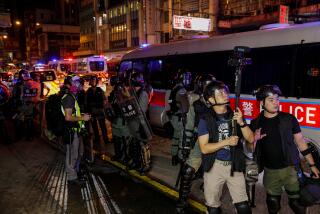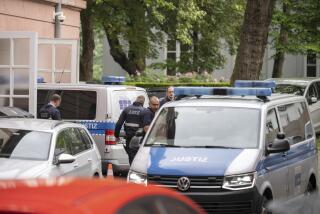Bomb plot was no hoax, jury told
LONDON — Six men plotted to kill subway and bus passengers with bombs made from hydrogen peroxide and flour, two weeks after suicide bombers killed 52 commuters here, a British prosecutor told a jury Monday.
No one was killed in the attempted bombings of three subway trains and a bus on July 21, 2005, because the devices failed to explode.
“We say that the failure of these bombs to explode owed nothing to the intentions of the defendants. It was simply the good fortune of the traveling public that this day they were spared,” prosecutor Nigel Sweeney said.
“This case is concerned with an extremist Muslim plot, the ultimate objective of which was to carry out a number of murderous suicide bombings,” Sweeney told jurors.
Muktar Said Ibrahim, 28; Ramzi Mohamed, 25; Yassin Omar, 26; Manfo Asiedu, 33; Adel Yahya, 24; and Hussain Osman, 28 -- all from London -- deny charges of conspiracy to murder and conspiracy to cause explosions.
Sweeney said Osman had told police the bombs were “a deliberate hoax in order to make a political point” and were not intended to kill. But Sweeney said forensic scientists had tested the mixture, and “in every experiment this mixture has exploded.”
The detonators contained triacetone triperoxide, an explosive used by Palestinian suicide bombers. The explosives were packed in plastic tubs, with screws, bolts and other pieces of metal taped on the outside as shrapnel, the prosecutor said. He said the hydrogen peroxide was a concentrated form.
Sweeney said the components for the bombs were bought beginning in April 2005, proving the attacks were “not some hastily arranged copycat” of the July 7 transit bombings.
He said police had found extremist Islamic literature in the suspects’ apartments, and several had attended the Finsbury Park Mosque to hear speeches by now-jailed radical preacher Abu Hamza al Masri.
Eleven other people -- including Osman’s wife and sister-in-law -- have been charged with assisting the accused or failing to disclose information. Their trials are due to take place this year.
More to Read
Sign up for Essential California
The most important California stories and recommendations in your inbox every morning.
You may occasionally receive promotional content from the Los Angeles Times.










